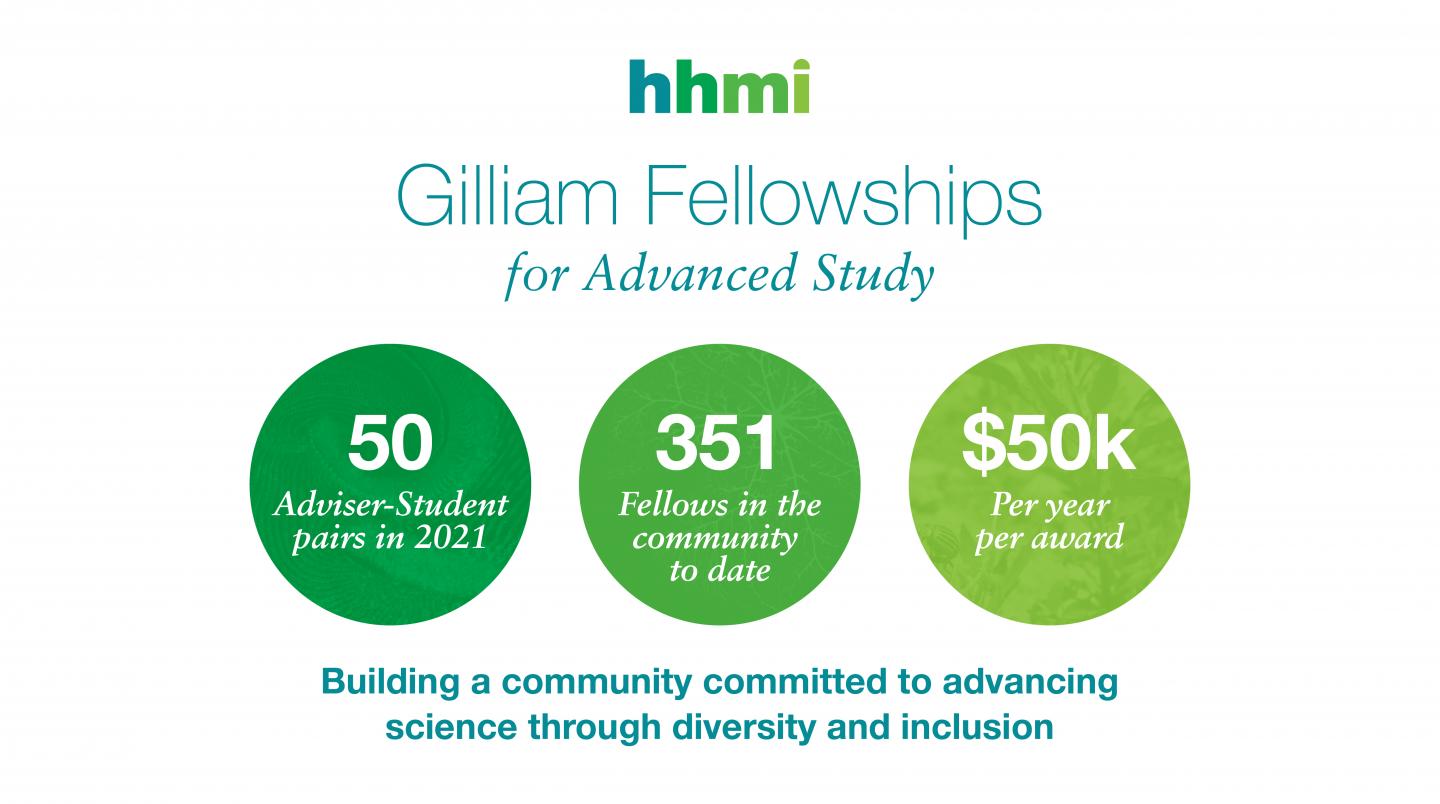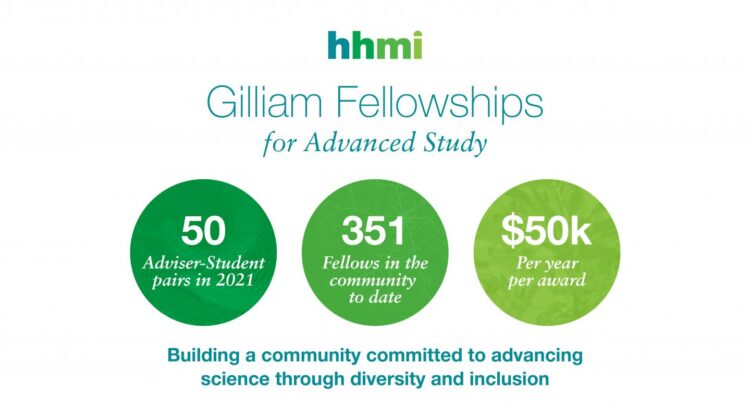
Credit: HHMI
They come from 38 schools across the country. Their research spans the life sciences, from plant biology to evolution. And they represent the largest group of fellows selected in the Gilliam Program’s history.
Today, the Howard Hughes Medical Institute (HHMI) announces 50 new Gilliam fellowships awarded to graduate students conducting outstanding research in their respective scientific fields and their advisers, who are committed to building a more inclusive scientific ecosystem. For up to three years, each adviser-student pair will receive an annual award totaling $50,000. Fellows’ research includes studying how malaria parasite broods destroy red blood cells and trying to identify the source of pollution behind harmful algal blooms in a river used by the Seneca Nation and other communities.
“I was struck by the scientific maturity of these students,” says David Asai, HHMI’s senior director for science education. “They’re all doing great science, and they can talk about it in a way that people understand.” What’s more, he adds, their advisers are serious and thoughtful about their role as mentors and their plans to create healthy academic cultures at their universities.
Mentorship is a Gilliam hallmark, and one way the program is sparking a cultural shift on campuses. Since its inception in 2004, HHMI’s Gilliam Program has worked to ensure that students from populations historically excluded and underrepresented in science are prepared to become scientific leaders. To retain as many of these students as possible in PhD programs, it’s crucial to provide high-quality mentoring, as well as financial support, an inclusive lab environment, and a supportive community, Asai says.
In total, the Gilliam Program has now selected 351 fellows, and from 2015 to 2021, the program has focused heavily on developing academic mentors. To date, the program, in collaboration with the Center for the Improvement of Mentored Experiences in Research (CIMER), has trained 199 mentors on how to create an environment that helps students of all backgrounds feel like they belong – in the lab and in science. Gilliam advisers participate in a year of mentor development activities that emphasize cultural awareness, including monthly online training and two in-person workshops at HHMI headquarters in Chevy Chase, Maryland. Together, the activities teach advisers how to listen and engage across cultures.
By training mentors and supporting the growing Gilliam community, the program aims to make the academic environment inclusive so that students see themselves in science. Eventually, Asai hopes, this will increase the diversity of scientists at the faculty level. “Diversity in science should be the norm,” he says. “We should expect to see talented students and scientists from underrepresented groups on college campuses and across all of science.”
An adaptive and supportive community
As the pandemic shifted students and advisers into the virtual world, Gilliam Fellows and advisers had to adapt. Though the program scrapped plans for the 2020 spring and fall in-person mentor workshops, the Gilliam advisers were still eager to learn. “We had so many advisers reach out and say, ‘We need resources,'” says HHMI program officer Sonia Zárate.
So last year, the Gilliam Program hosted online webinars for advisers interested in learning more about culturally responsive mentoring. Zárate and Asai hope to resume the in-person workshops in 2022. Acknowledging people’s lived experiences and how systemic racism creates an uneven landscape across science is an integral part of mentoring – and something more advisers are recognizing, Zárate says.
Gilliam Fellows found ways to connect during the pandemic, too. Fellows typically gather annually at the program’s science meeting at HHMI headquarters. When the meeting moved online in 2020, students lost an opportunity to share their research in person. So instead, fellows began gathering spontaneously on Zoom.
Students self-organized, met virtually, and spoke up about matters important to them. In 2020, they advocated for promoting mental health and wellness at the annual meeting. This year, fellows have expressed interest in inclusive science communication, like advocating for diversity and inclusion in science and learning how to dispel science misinformation.
“The fellows are quite active in trying to change the world,” Asai says. “That shows you the kind of students we have.”
Members of the Gilliam community also support each other outside of the annual meeting. Fellows regularly celebrate one another’s successes and provide updates on their career journeys on social media. And since 2017, the program has maintained a listserv where alumni and fellows can ask for career advice and post job opportunities. Even though some have never met in person, members of the community often answer questions and share their experiences. “People who graduated and left our program years ago are now stepping up to mentor current fellows,” Zárate says.
She and Asai hope that the efforts of these mentors and the Gilliam advisers snowball over time, until the culture of science changes and the academic environment feels inclusive to students of all backgrounds – Gilliam Fellows and beyond.
###
HHMI created the Gilliam Fellowships for Advanced Study in honor of the late James H. Gilliam, Jr. A charter trustee of HHMI, Gilliam was a respected business and civic leader who spent his life nurturing excellence and diversity in science and education.
To be eligible for a Gilliam Fellowship, students must be enrolled in their second or third year of a PhD program in biomedical or life sciences disciplines, but not in an MD/PhD program. Students must be from racial, ethnic, or other underrepresented groups in the sciences, or alumni of the HHMI EXROP program. Students must aspire to careers in academic science and demonstrate a commitment to the advancement of diversity and inclusion in the sciences.
Media Contact
Meghan Rosen
[email protected]
Original Source
https:/





